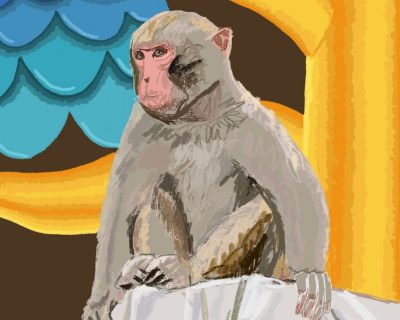An unfortunate and perhaps largely invisible consequence of the pandemic has been its effect on the animal population. Though COVID-19 — a zoonotic virus — likely originated in wild horseshoe bats, it has spread widely and prominently throughout the human population.
Animals have been deemed unlikely to spread the virus. Yet this cross-species disease can be contracted by not only humans or bats, but also minks, domesticated cats and dogs, lions, tigers, apes, ferrets, raccoons and white-tailed deer.
This means as the primary host, humans are capable of and have indeed spread the virus to other species in captivity.
At San Diego Zoo Safari Park, gorillas — a species that shares 98% of our DNA — have tested positive for coronavirus because they came in contact with an asymptomatic zookeeper.
This incident has raised awareness and interest in animal vaccines. The San Diego Zoo has already vaccinated some apes with the Zoetis vaccine. If zoos were not so normalized, there would be very few apes in captivity and therefore very few at a higher risk for COVID-19.

It’s not just zoos, either. A Denmark mink farm was responsible for a coronavirus outbreak among the species, leading to a government-issued killing of millions of minks.
It is our responsibility to vaccinate animals that are forced to live in close quarters and in close contact with humans, especially when we’re the ones transmitting the virus to them and the ones who coerced them into artificial habitats in the first place.
Beyond the issue of COVID-19, both fur farms and zoos are notoriously inhumane.
The documentary “Blackfish” on SeaWorld’s treatment of orca whales and the killing of Harambe the gorilla at Cincinnati Zoo have been key mainstream talking points in the debate over the ethics of zoos. On the other side, supporters of zoos have pointed out their benefits: science, conservation, empathy toward animals and education.
Yes, if zoos operated differently and were structured differently — perhaps more like wildlife sanctuaries — the pros of conservation and education might outweigh the cons of animal cruelty.
As it stands now, zoos aren’t even major conservation players. Around 95% of animal species featured in European zoos are not endangered. Some species are endangered and bred, but captive-born animals are unable to be properly rehabilitated and reassimilated into the wild and have not made significant contributions to wild mammal populations.
Unlike wildlife sanctuaries, zoos also displace “exotic” animals from their natural habitats and cause animals held in captivity such anxiety, depression and distress that there is a name for this behavior: zoochosis.
Worldwide, many zoos still train animals for entertainment, which typically entails physical punishment and cruel treatment. Seventy-five percent of more than 1,200 zoos surveyed by the World Association of Zoos and Aquariums indicated offering these activities.
Perhaps most shockingly, zoos regularly put down “surplus” animals in an act known as “management euthanasia.” In Europe, this amounts to 3,000 to 5,000 animals annually.
On the education front, the majority of zoo-goers don’t even improve biodiversity knowledge or conservation awareness after their visits. It’s hypocritical, too, to assume education and empathy for animals could be taught in an environment that is actively harmful to said animals. Wouldn’t active conservationists question the morality of the zoo?
Regardless of which way you spin it, the proof is in front of us. Zoos are a dying industry that must adapt to be more ethical — like the Philadelphia Zoo that has a Zoo360 concept or the St. Louis Zoo that boasts better, more spacious facilities and fewer number of animals — or be done away with entirely.
Some top zoos could become “unzoos,” which flip the human-centric experience of zoos on its head. Unzoos would focus primarily on the animals’ habitat, comfort and privacy, bringing humans into the fold after the fact.
However, most don’t have the budget to fund this restructuring, and therein lies the problem: The very foundation of zoos is built on captivity and capitalism. When the priority is profit over animal welfare, the outcome will never be ethical or humane.
The COVID-19 gorilla outbreak in the San Diego Zoo is only the most recent symptom of a tainted, outdated system.




















































































































